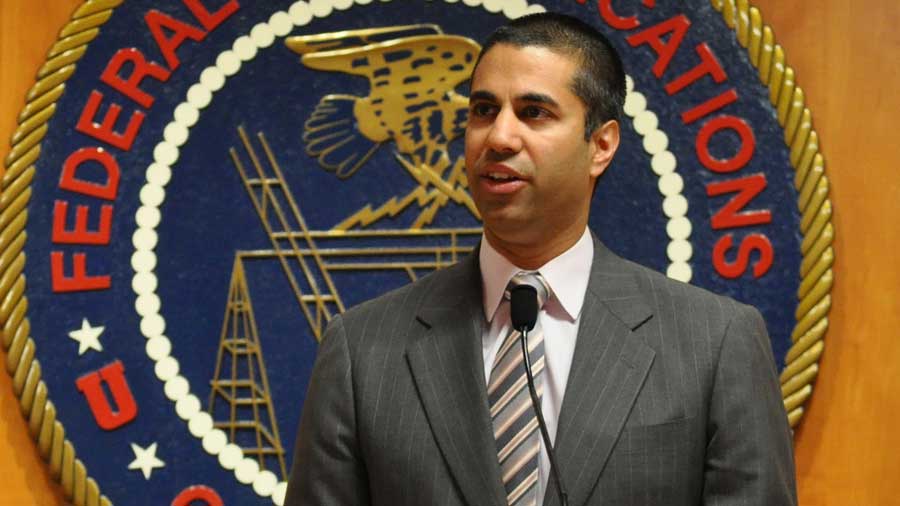Pai: Apple Promoting Online Censorship

The smarter way to stay on top of broadcasting and cable industry. Sign up below
You are now subscribed
Your newsletter sign-up was successful
FCC chairman Ajit Pai suggests the parade of horribles whipped up by foes of his network neutrality rule rollback order are just meant to feed into a false narrative, and that the real story is that edge providers are a bigger threat to an open net than ISPs and could use some of the transparency the FCC will be requiring of ISPs.
He got specific in an op ed in conservative newspaper, The Washington Times.
Pai suggested that Apple was sending coded messages to China about censoring content.
"[J]ust this weekend, Apple’s chief executive gave a keynote address at the World internet Conference in China," he wrote. "That gathering promotes China’s vision of government censorship of the internet. What did he say there? Among other things: 'We are proud to have worked alongside many of our partners in China to help build a community that will join a common future in cyberspace.' That is code for a censored internet. And it should alarm anyone who believes in internet freedom.'
Pai's plan to remove most net neutrality regs on ISPs is scheduled to be voted Dec. 14: "'Some have tried to whip Americans into a frenzy by making outlandish claims. Feeding the hysteria are silly accusations that the plan will 'end the internet as we know it'or threaten American democracy itself," he said.
"These claims obscure a pretty mundane truth: This plan would simply restore the successful, light-touch regulatory framework that governed the internet from 1996 to 2015. And importantly, it would get the government out of the business of micromanaging the internet."
Pai has been on something of a "light touch" tour in speeches and appearances to counter that net neutrality activist narrative, as well as raising a heavier hand in the direction of Silicon Valley.
Related: Pai: Twitter Bigger Threat Than Open Net ISP's
Pai has long argued that ISPs were unfairly singled out as gatekeepers in an internet ecosystem that included massively powerful edge players.
He says it is false to suggest that Title II-based regs, which he labeled the Obama FCC rules, are necessary.
He reiterated his theory of why edge providers like Google and Amazon generally support net neutrality regs. "Saddling internet service providers with tougher regulations than apply to themselves helps them cement their dominance over the internet economy."
He called that regulatory arbitrage that was not in the public interest., and reiterated his attack on the edge from last week that "large Silicon Valley platforms today pose a far greater threat to a free and open internet than do internet service provider."
His other illustrations of that point included that Twitter did not allow House Communications Subcommittee chair Marsha Blackburn (R-Ten.), to promote her Senate campign video because of a pro-life message and YouTube restricted access to video from some conservative commentators.
There is a growing tension in Washington between the pressure not to censor online content, and for social media to better police their content for inappropriate content like hate speech, terrorist recruitment or sexual solicitation.
"If these companies are truly committed to an open internet where Americans can freely access the content of their choice, like I am, it’s curious that they focus on unnecessary and harmful regulation of other parts of the internet ecosystem with little history of engaging in this kind of behavior," he said.
The centerpiece of Pai's new regulatory proposal is removing regs, boosting ISP transparency about what they are doing--paid prioritization, or blocking or throttling, though ISPs say they won't do the last two--then have the Federal Trade Commission hold them to those promises, and the Justice Department backstop any anticompetitive conduct.
He said Silicon Valley could use some similarly disinfecting sunlight.
"Right now, consumers are largely left in the dark when it comes to how these companies determine what American consumers see in their newsfeeds or search results," he said. "For example, these platforms could be using algorithms that favor content with certain viewpoints, and their users would have no way of knowing that they were being manipulated in this way. Is this a problem that needs to be addressed, and if so, how? I don’t claim to have all of the answers, but I do think these are questions worth raising.
"So as we think about internet policy, we should look at the entire internet economy — not single out one part of it."
An Apple spokesperson was not available for comment at press time.
The smarter way to stay on top of broadcasting and cable industry. Sign up below
Contributing editor John Eggerton has been an editor and/or writer on media regulation, legislation and policy for over four decades, including covering the FCC, FTC, Congress, the major media trade associations, and the federal courts. In addition to Multichannel News and Broadcasting + Cable, his work has appeared in Radio World, TV Technology, TV Fax, This Week in Consumer Electronics, Variety and the Encyclopedia Britannica.

